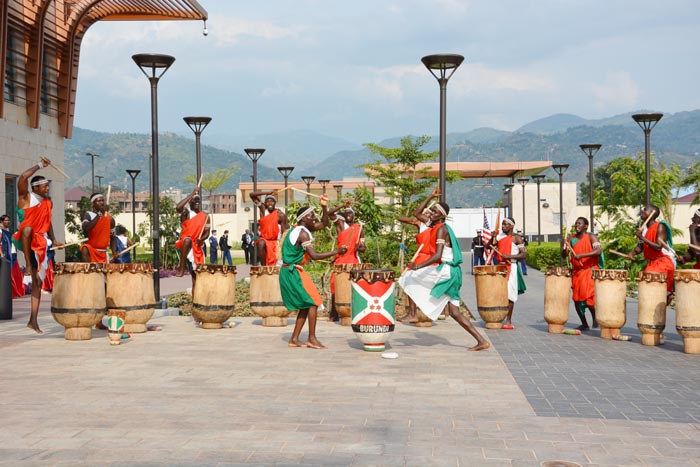On November 26th, Burundi’s royal drum dance was declared Intangible Cultural Heritage by UNESCO. The Ministry of Youth, Sports and Culture is implementing several plans to protect and safeguard it.-By Diane Uwimana
In pre-colonial time, playing the drums regulated the activities of Burundi’s royal family. “Drums were played to mark the beginning and the end of the daily royal activities”, says Elvis Vyizigiro, a historian. “Drums were played to mark important events, such as the “umuganuro” party, the party of seeds when the King blessed his people and opened the season of cultivation. Other rituals include marking the death of a king and inauguration of a new one. The drums were played to show that a new life started at the royal palace.”
Drums were also played when the country was invaded by enemies and allowed people to escape. “That’s the reason why people say that it is not difficult to steal drums, but then you won’t be able to play it”, Vyizigiro says. “Since everyone will hear where the thieves are.”
New rules
Many visitors to Burundi have enjoyed watching the drummers perform at festivals or private celebrations. But it appears as if that custom will come to an end. “The drums will no longer be played whenever the drummers want”, says Adolphe Rukenkanya, the Minister of Youth, Sports and Culture. “We are going to protect the Gishora Sanctuary in Gitega province, where the traditional drums are kept. We’ll take measures to entrench the heritage and teach drumming in schools”, the Minister says.
The ‘umuvugangoma’ tree (whose trunk is used to make the drums) is going to be cultivated and protected. “Antime Baranshakaje, the guard of the drums at Gishora sanctuary, has begun to plant young trees in different locations particularly in the Gishora area in Gitega province and at the ‘Musée Vivant’ in Bujumbura. The Ministry will support him and multiply the tree by identifying where the ‘umuvugangoma’ grows naturally”, the minister adds.
He will also open a research department to allow anthropologists, scientists and researchers from different universities to study the ‘royal drum’. A commission in charge of promotion and protection of the Burundi drum will soon be implemented. “The commission will ensure that the drum is protected. Using the drums in a commercial way will be banned and punished accordingly.”
Loss of revenue for drummers
While the inclusion on UNESCO world Heritage list fills drummers with pride, the plans of the ministry are worrisome for many drummers, for playing the drums provides in their livelihoods.
Omer Nzoyisaba, the president of Intatana club: “For 15 years we played drums in our group, it would be better if the Ministry provides in activities to compensate our loss. Some measures must be put in place to ensure that youth and cultural groups will not be displaced”, he emphasises.




















 IWACU Open Data
IWACU Open Data

